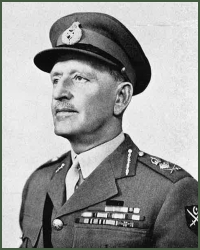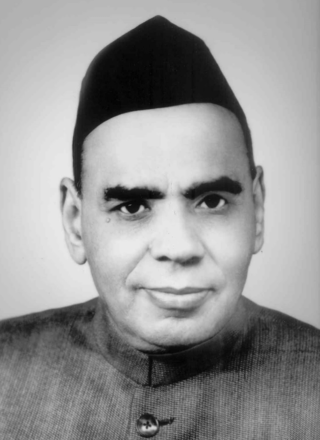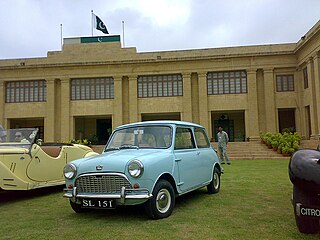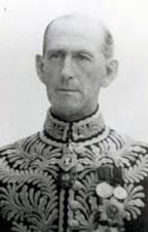
General Sir Douglas David Gracey & Bar was a British Indian Army officer who fought in both the First and Second World Wars. He also fought in French Indochina and was the second Commander-in-Chief of the Pakistan Army. Gracey held this latter office from 11 February 1948 until his retirement on 16 January 1951. Born to English parents living in India, he was educated in English schools before returning to India to serve in the military there.
Shah Nawaz Bhutto, was a politician and a member of Bhutto family hailing from Larkana in the Sind region of the Bombay Presidency of British India, which is now Sindh, Pakistan.

Hurs are a Sufist community in the province of Sindh, Pakistan who adhere to Sunni Islam. Their current spiritual leader is Pir of Pagaro VIII, who serves as a politician in the Provincial Assembly of Sindh.

Lieutenant-General Sir Archibald Edward Nye, was a senior British Army officer who served in both world wars. In the latter he served as Vice-Chief of the Imperial General Staff (VCIGS).

Lieutenant General Sir Reginald Arthur Savory was a British Indian Army officer who served during both World War I and World War II.
Sir Saiyid Fazl Ali OBE was an Indian judge, the governor of two Indian states, and the head of the States Reorganisation Commission which determined the boundaries of several Indian states in the December 1953.Their commission submitted the report in September 1953 broadly accepting the language as the basis of reorganisation of states.

Sir Chandulal Madhavlal Trivedi KCSI, CIE, OBE, ICS was an Indian administrator and civil servant who served as the first Indian governor of the state of Punjab after Independence in 1947. He subsequently served as the first Governor of Andhra Pradesh from its creation in 1953 until 1957.
Sayyid Sibghatullah Shah Al-Rashidi II, Pir Pagaro the sixth, was a spiritual leader of the Hurs during the Indian independence movement. Hur is a Sufi Muslim community in the province of Sindh. Sayyid Sibghatullah Shah Al-Rashidi was a champion of Hindu-Muslim unity, initially supporting the Indian National Congress and then the All India Forward Bloc.
Sir Ghulam Hussain Hidayatullah KCSI was a colonial Indian and Pakistani politician from Sindh. He held several offices in Sindh including 1st Chief Minister (1937–1938) and being re-elected as 5th Chief Minister (1942–1947).
Allah Bux Muhammad Umar Soomro, or Allah Baksh Soomro, was a zamindar, government contractor, Indian independence activist and politician from the province of Sindh in colonial India. He is considered to be amongst the best premiers of the province, known for promoting Hindu-Muslim unity and campaigning for an independent, united India. He was referred to as Shaheed or "martyr".
Khan Sahib Shahal Khan Khoso (1909–1956) came from a family which had, since the many last centuries, been prominent among the landed aristocracy of the Sindh. He was a Member of the West Pakistan Legislative Assembly from 1953 to 1956, belonging to Khoso Baloch family of Thul district Jacobabad Sindh. His grandfather Dilmurad Khan khoso revolted against British in 1857 and was sent to Andaman Island.

The Governor's House in Karachi, Sindh, Pakistan is the official residence of the governor of Sindh. The current governor of Sindh is Kamran Tessori. It is located along the Aiwan-e-Sadar Road of Karachi.

Sir Lancelot Graham, KCSI, KCIE (1880–1958) was an Indian civil servant during the British Raj. He served as the first Governor of Sind from 1 April 1936 to 31 March 1941.
Sir Robert Francis Mudie KCSI, KCIE, OBE was a British civil servant and a member of the British Indian Civil Service during the British Raj. He was the last British and colonial Governor of Sind and after the partition of British India in August 1947, he served as the first Governor of West Punjab in the Dominion of Pakistan.
Sir Eric Charles Miéville was a senior British civil servant who served as Assistant Private Secretary to George VI from 1937 to 1945, and who also served as Private Secretary to several Governors-General of India and Canada.
Sayyid Shah Mardan Shah-II widely known as Pir of Pagaro VII was the spiritual leader of Hurs and president of political party Pakistan Muslim League (F). He was commonly known in Pakistan as Pir Sahib Pagara and Pir Shaab. He was an influential figure in Pakistani politics and the leader of Hur Force in Pakistan who also participated in the Indo-Pakistani War of 1965. He was also a first-class cricketer. He died on 10 January 2012 in London, due to liver infection.

Bihar Province was a province of British India, created in 1936 by the partition of the Bihar and Orissa Province.
Sarah Frances Deborah Ansari is a British professor of history at Royal Holloway, University of London. She is a specialist in the recent history of South Asia, and particularly Pakistan and the partition of India.
Hugh Trevor Lambrick CIE was a British archaeologist, historian and administrator.








